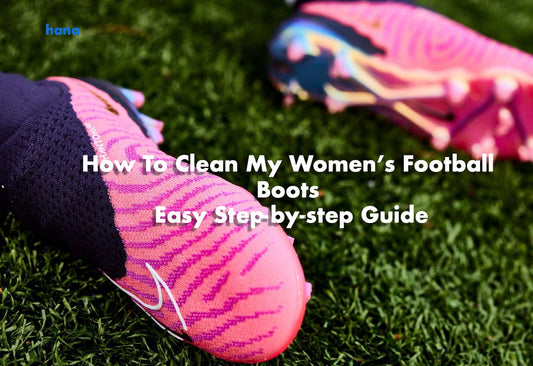Want to stand out among the 29,000,000 female football players worldwide and become a professional athlete on the field? I will use my story to tell you what you should do at different ages and how to continuously progress towards your dreams.
1. Enlightenment
At the age of three, my 6-year-old cousin would kick a football ball around the house, but I had no interest in this noisy big ball at the time. It wasn't until I was five, on the way to the park with my grandmother, that I saw a neighbor girl playing a match on the field. That's when I ignited my interest in this sport and started my journey in football.

I won't set a standard enlightenment time for getting into football because everyone's life journey is different. Some may start playing at the age of three, while others might not develop an interest until almost 10. This is normal and makes no difference to your whole career.
For this stage, I have only one piece of advice:
- play and have fun.
2. Academy
After playing football for three years, it became difficult for the kids in the street to stop me from scoring and dribbling. In 24 matches with boys taller and stronger than me, I scored 16 goals and provided 5 assists. My outstanding performance led my mom to consider enrolling me in a real football academy. I attended trials at Arsenal and two other football clubs, but eventually chose the one closest to home, and spending three years there. During this period, I continued to score many goals in official matches, and at the age of 11, I joined competitions with 13 and 14-year-olds.

For girls at this stage, playing football is enjoyable. It's an opportunity to make best friends in the club, while tactical requirements start emerging in matches. Compared to games in the street or community pitches, matches at this stage become more organized, demanding tactical discipline.
Here are some suggestions for lionesses at this stage:
- Find your speciality: If you notice that you effortlessly outrun your teammates or no one can catch you up when accelerating, speed might be your strength. Use it to your advantage, like making quick runs on the wing or initiating fast counterattacks. If, like me, you are not good at pace or physical prowess, find your strengths. For example, I can always find open spaces on the field, delivering precise passes that lead to scoring opportunities for my teammates.
- Learn self-protection: My first injury occurred at this stage due to a reckless tackle, as I lacked awareness of how to protect myself upon landing. After numerous matches, you must learnt how to protect yourself intelligently, but I' m not ask you to dive on the field; instead, be smart in avoiding the impact of opponents' tackles. For more details, check our previous blog post.
- Stay passionate and confident: It's at this stage that I encountered more talented peers, faced tough opponents, and tasted the bitterness of failure. But it's normal. Just keep your love for football, give your best effort in every training and match, and that's enough.
3. Youth teams
Between the ages of 13 and 17, I fortunately joined Millwall's professional youth team. This meant that if I could make progress and breakthroughs in these years, I would have the opportunity to play in the WSL. To pursue this dream, I literally all-in every game and training session. I practiced free kicks alone after training, and despite my dedication to football, I didn't neglect my study. I also found another hobby, painting. However, during these years, injuries gradually found me – thigh muscle strains, ankle ligament sprains, and more. Each time I started performing well in consecutive games, I had to step away from the field due to injuries. Simultaneously, I encountered incredibly talented girls from all over England and Europe. I often tried to improve through extra training, but the gap in talent seemed impossible to bridge with just sweat. Two months after my 17th birthday, due to persistent injuries and diminishing opportunities, I decided to step away from the professional path. However, even after leaving the professional team, I didn't stop my love for football.
If you find yourself fortunate to be in this stage, I'll tell you how to plan your career path correctly:
- Be professional in recovery and nutrition: club's food are excellent, but sometimes relying solely on them isn't enough. Take extra steps to protect your body. Learn players' recipes – boiled chicken breasts, broccoli, steak – and stay away from carbonated drinks and chocolate. It may be painful, like depriving yourself of a pleasure in life, but keep following this disciplined diet can improve your body's health, flexibility, and endurance on the field. Additionally, prioritize recovery after matches, do stretches before bedtime, and exercise self-discipline by turning off your phone for sufficient sleep. Besides, the money you spend investing on yourself is worthy, such as a personal trainer , high quality football kits or football socks.

- Strong mentality: Maintain an optimistic mindset and always be hopeful. Remember that the turning point in your career may happen in an unexpected substitute appearance. Seize any opportunity, play your best, and you'll become a rising star. Regardless of the challenges you face now, stay patient and believe in yourself.
- Watch professional matches as much as you can: mimic players in your position, constantly reflect, and improve football IQ. Football IQ is your only chance against genius opponents. A well-timing pass or a correctly positioned defense can change the game's dynamics. These skills go beyond talent and require continuous observation, imitation, and learning.
- Balance life and football: Life always comes first, and while football is essential, it can't replace your entire life. Actively explore all possibilities in life, meet more people, and try various hobbies. Never stop learning – it keeps your mind active, not only helping you understand football better but also benefiting other aspects of your life.








